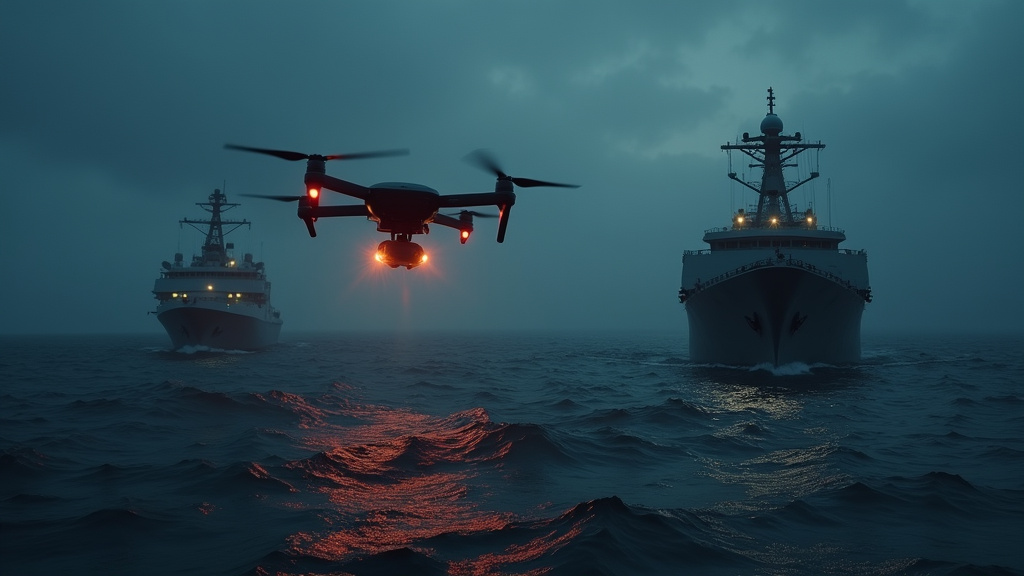In a significant escalation of maritime tensions, Italy and Spain have dispatched naval vessels into the Mediterranean Sea to escort and protect the Global Sumud Flotilla (GSF), an international convoy carrying humanitarian aid to Gaza. The decision comes after the flotilla reported being targeted by drone attacks, including the dropping of explosive devices and interference with communications, while navigating international waters off Greece.
Drone Attacks Target Humanitarian Convoy
The Global Sumud Flotilla, comprising approximately 50 civilian boats and carrying participants from over 45 countries, stated that drones attacked its vessels overnight, near the Greek island of Gavdos. Activists reported hearing more than a dozen explosions, with drones dropping “flashbang”-type explosive devices and other “unidentified objects” on and near the boats. The flotilla also reported significant disruption to its communications due to jamming. Organizers accused Israel of a “dangerous escalation”, while the flotilla itself maintained it is a peaceful, non-violent mission committed to delivering humanitarian aid. This incident marks the latest in a series of reported attacks and harassments against the flotilla since it set sail.
European Naval Response and Diplomatic Declarations
Responding to the reported attacks, Italy announced it was sending its navy to safeguard the flotilla and its citizens. Italian Defence Minister Guido Crosetto condemned the attacks as coming from “currently unidentified perpetrators” and ordered a multi-purpose frigate, the ITS Fasan, to head towards the flotilla area for possible rescue operations. Italy later confirmed it was sending a second navy ship. Prime Minister Giorgia Meloni condemned the drone attack but also characterized the flotilla’s mission as “dangerous and irresponsible”.
Spain quickly followed suit, with Prime Minister Pedro Sánchez announcing that a Spanish naval vessel would be dispatched from Cartagena to provide assistance and support to the flotilla. Sánchez emphasized Spain’s demand for compliance with international law and respect for the right of its citizens to navigate the Mediterranean safely. He also stated that Spain would protect its nationals both diplomatically and politically. The Spanish Ministry of Defence has reportedly coordinated with its Italian counterpart to explore broader collaborative actions.
Flotilla’s Mission and International Context
The Global Sumud Flotilla’s stated objective is to break the 18-year-long Israeli naval blockade on the Gaza Strip and deliver essential humanitarian aid, including food and medical supplies, to the besieged Palestinian population. Participants include a diverse group of activists, lawyers, doctors, and journalists, with notable figures such as Swedish climate activist Greta Thunberg and South African MP Mandla Mandela on board.
Israel has consistently stated it will not allow the flotilla to breach its blockade, which it maintains is for security reasons to prevent Hamas from importing arms. The Israeli Foreign Ministry has accused organizers of being linked to Hamas, an assertion that the flotilla organizers vehemently deny. Israel has proposed that the aid be unloaded at an Israeli port for onward transfer to Gaza.
The United Nations has called for an “independent and impartial” investigation into the alleged drone strikes. The deployment of naval ships by Italy and Spain underscores the heightened international attention on the Gaza crisis and maritime security in the region, bringing the flotilla’s efforts into the global spotlight. This news is currently trending, highlighting the complex geopolitical dynamics surrounding humanitarian aid delivery to Gaza. The situation remains a top news item as the flotilla continues its journey under the watchful presence of European naval assets, amidst ongoing concerns for the civilian population in Gaza, where a severe humanitarian crisis persists. The events are the subject of much discussion, making this news particularly hyped.





